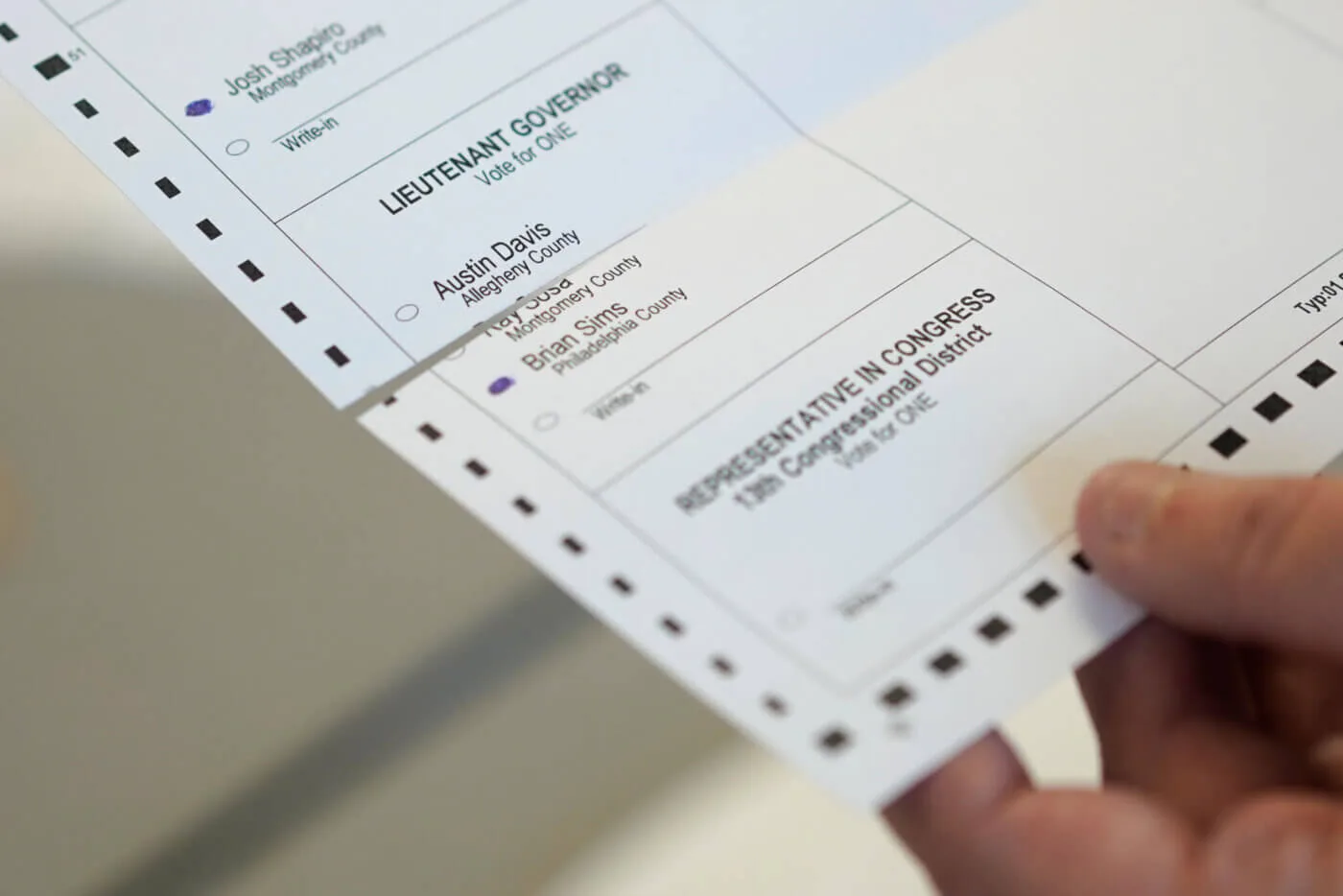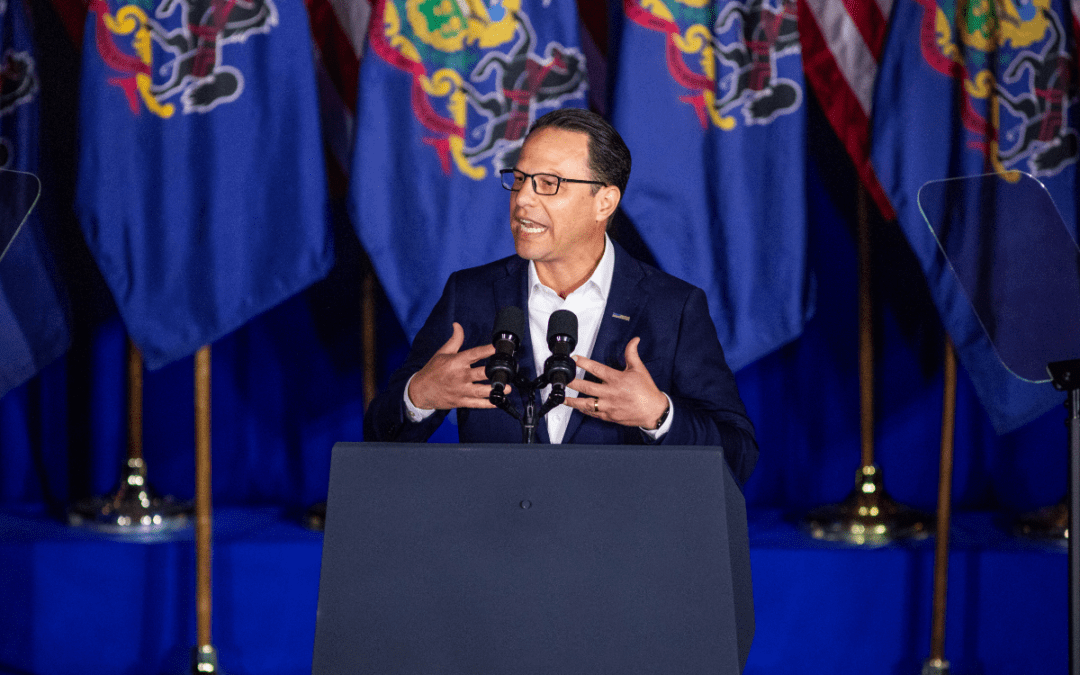
A damaged ballot torn along the fold that would not go through the electronic ballot scanner, is reviewed and duplicated by Democrat and Franklin County Commissioner Bob Ziobrowski and Republican and member of the Franklin County election board Jerry Warnement the morning after the Pennsylvania primary election at the Franklin County offices in Chambersburg, Pa., Wednesday, May 18, 2022. (AP Photo/ Carolyn Kaster)
While national attention rightly fell on a proposed abortion ban enshrined in a constitutional amendment, four other changes to the Pennsylvania Constitution were included in the package deal that could greatly affect residents of the commonwealth.
Pennsylvania Republicans were looking to do more than just restirct abortion access earlier this month when they passed a package of proposed constitutional amendments.
While national attention rightly fell on a proposed abortion ban enshrined in a constitutional amendment, the Republican-majority state Senate advanced four other proposed changes to the Pennsylvania Constitution that could greatly affect voter rights and the power of the governor’s office.
In addition to adding language to the Pennsylvania Constitution stating explicitly that the document does not guarantee any rights relating to abortion or public funding of abortions, Senate Bill 106 proposes the following amendments:
- Require voters to show ID at polling places.
- Let lawmakers vote down regulations without facing a governor’s veto.
- Allow the General Assembly to set up a system for the auditor general to conduct election audits.
- Make the Lt. Gov an appointed, not elected, position.
“There are certainly occasions when we should consider amending our constitution, but this is not something to be taken lightly or done politically,” Senate Minority Leader, Jay Costa (D-Allegheny), said. “This new fad of legislating by constitutional amendment dramatically reshapes Pennsylvania’s state government.”
SB 106 passed the Senate by a 28-22 vote and is now in the House for consideration.
A constitutional amendment has to pass both chambers — House and Senate — in consecutive two-year legislative sessions, then be advertised to the public before the next fall election. The amendments would then go before voters as separate ballot questions for the final say.
Costa echoed widespread criticism that Republicans have increasingly used the amendment process to circumvent Gov. Tom Wolf’s veto, which they don’t have the votes to override.
“The constitution is meant to protect the liberties and rights of Pennsylvanians, not to be used as a tool to enshrine the prohibition of rights or make it more difficult for voters to participate,” Costa said.
Let’s take a look at the “other” amendments Pennsylvania Republicans are trying to make to the state constitution.
Requiring Voter Identification
Currently in Pennsylvania, a registered voter only needs to show their ID when voting at a polling place for the first time.
The Senate Republicans’ proposed amendment would require voters to show identification every time they vote.
Republican lawmakers say the amendment is needed to bolster faith in the state’s election system. Yet, much of the distrust over the state’s system has been fueled by Republicans who spread misinformation and publicly questioned the accuracy of the 2020 election results and President Joe Biden’s win in the commonwealth.
GOP candidate and state Sen. Doug Mastriano (R-Franklin) continues to spread the “Big Lie” and wants to force every voter in the state to re-register if he’s elected governor.
Republicans such as Sen. Cris Dush (Jefferson), Sen. Jake Corman (Centre), and Rep. Seth Grove (York) continue to fight Act 77, which allows absentee and mail-in voting in the commonwealth.
Dush is also in charge of a Republican-fueled “forensic investigation” of the state’s 2020 presidential election that has subpoenaed the state for the personal information of all registered voters in Pennsylvania.
Democrats have long opposed voter ID requirements, saying it could negatively impact minority and elderly voters who might lack proper identification.
Gov. Wolf has vetoed legislation that proposed implementing voter ID.
“Republicans want to impose a barrier to voting that would disproportionately disenfranchise low-income, urban and elderly voters,” House Democratic leaders said in a joint statement. “Voter ID is a costly, duplicative and bureaucratic waste of time, and is a solution to a non-existent problem.”
Voting Down Regulations Without a Governor Veto Option
In Harrisburg, lawmakers can vote to disapprove a state regulation (such as those passed during the COVID-19 pandemic), but the governor has the power to veto it. The legislature would then need a two-thirds majority vote to override the veto.
Rep. Eric Nelson (R-Westmoreland) said the bar is too high. Nelson introduced the proposed amendment to change the process and allow lawmakers to vote down a resolution with no fear of an impending veto.
“The idea that it takes a two-thirds majority of the General Assembly to stop a regulation or order that the majority would never start in the first place proves how unbalanced the process is in the first place,” Nelson said.
Political experts, on the other hand, say Wolf’s vetoes are a sign that the checks and balances system intended by a three-branch government is working.
Because one party does not have enough votes to overturn a veto alone, majority and minority parties are encouraged to work together with the governor to pass bipartisan policy — in theory.
In 2021, Wolf signed more than 100 bills and resolutions, including 20 renaming bridges and highways, a COVID-19 relief package, and a measure creating an agency dedicated to expanding broadband coverage in the state.
Allowing State Auditor General to Conduct Election Audits
Touted as another effort to restore faith in the election system in Pennsylvania, Sen. Ryan Aument (R-Lancaster) introduced a constitutional amendment that would allow the state Auditor General to conduct regular election audits. The proposal would prohibit the Department of State, PennDOT, and counties from withholding information necessary to conduct a full and comprehensive audit. It also requires an annual, independent audit of the Statewide Uniform Registry of Electors (SURE) system.
“It is entirely unacceptable for a government agency to withhold information needed to conduct an independent, impartial review of our elections,” said Aument. “Ensuring transparency and accountability from the agency responsible for administering our elections will help Pennsylvanians regain trust in results and in the process.”
It’s worth noting that more than a month after the Pennsylvania primary election was settled and counts supposed to be certified, three counties are still refusing to certify accurate results. Allowing the general assembly to set up a system for the auditor general to conduct election audits could create an environment where these efforts to delegitimize elections become the norm, according to Democrats.
Making the Lt. Governor an Appointed Position
In Pennsylvania, currently, candidates for governor and lieutenant governor run in separate primaries for their party’s nomination. The candidates then form a joint ticket for the November general election.
The proposed amendment, introduced by Sen. Dave Argall (R-Schuylkill), would allow a gubernatorial candidate to choose their running mate after the spring primary, subject to approval from their party’s state committee.
Lawmakers on both sides of the aisle say it’s a necessary change to a process that has not always yielded the best results.
“In the past, we have seen a leadership team separate into two warring factions that spent weeks not even talking to one another,” Argall said. “If we want to succeed in Pennsylvania, then our top two executive officials need to see eye-to-eye on the issues and not get distracted by petty rivalries.”
Argall was referencing the tumultuous relationship between Wolf and former Lt. Gov. Mike Stack. In 2017, Wolf stripped Stack of his police protection while in office after allegations emerged of Stack and his wife being verbally abusive to their security detail and household staff.
Politics

736,000 PA households could lose crucial help on their internet bills
Time is running out for the Affordable Connectivity Program, which provides low-cost high speed internet access for over 736,000 Pennsylvania...

What to know about Trump’s legal issues
Over the past year, former president Donald Trump has become the center of not one, not two, not three, but four criminal investigations, at both...

Shapiro aims to eliminate waiting list for services for intellectually disabled adults
HARRISBURG, Pa. (AP) — Gov. Josh Shapiro and his top human services official said Wednesday that the administration has a plan to end a waiting list...
Local News

Conjoined twins from Berks County die at age 62
Conjoined twins Lori and George Schappell, who pursued separate careers, interests and relationships during lives that defied medical expectations,...

Railroad agrees to $600 million settlement for fiery Ohio derailment, residents fear it’s not enough
Norfolk Southern has agreed to pay $600 million in a class-action lawsuit settlement for a fiery train derailment in February 2023 in eastern Ohio,...






